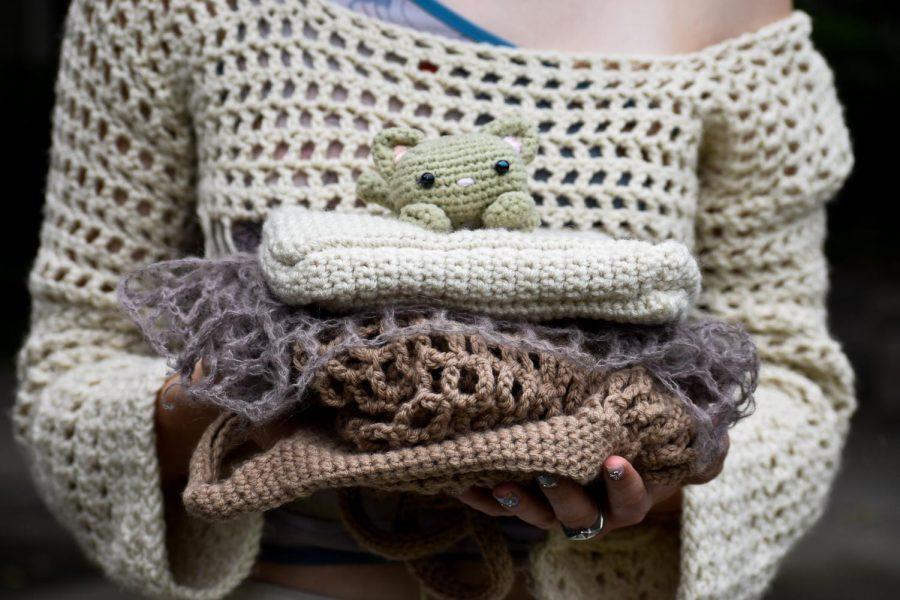Knittsburgh: Pitt’s close-knit community
Romita Das | Senior Staff Photographer
Julianna Paul holds a pile of her knitting and crochet projects.
September 14, 2022
For some, the art of crocheting and knitting is just a hobby for older generations, but Knittsburgh is quickly changing that narrative at Pitt. Oliver Petersen, the club’s vice president, connected with his grandmothers through knitting, and it helped him carry on a fun family tradition.
“Both of my grandmothers used to do a lot of knitting and crocheting and they can’t anymore because of health problems, but they love that I can knit and always try to pass on their knowledge of it to me,” Petersen, a sophomore biology major, said. “Knitting is something that has been passed down through generations in my family, and I get to feel that connection and feel closer to my family when I knit.”
Knittsburgh helps students learn how to knit and crochet and provides a community for “yarners,” a term coined by club members, to chat and escape from the stress of school. The club meets every Thursday on the second floor of the Cathedral of Learning from 9-10 p.m. There are no required dues and people can attend whenever they are available.
Julianna Paul, the club’s president, said when she first joined during her first year, the club met over Zoom due to the COVID-19 pandemic and there were only 12 members. Now there’s more than 200 members, which Paul largely attributes to a rising need for a “therapeutic hobby” on campus.
“I think knitting and crocheting has especially skyrocketed in popularity over quarantine because people needed good stress relief,” Paul, a junior biology major, said. “I think, especially for students, it can be sort of an escape from everything that’s going on and gives you a chance to just focus on one thing.”
Chris Matthews, another “yarner” in Knittsburgh, said he believes the club has grown in popularity due to social media and Gen Z’s growing interest in sustainability.
“You’re making your own clothing a lot of the time, and I think that is why it’s come back to Gen Z and stopped being stigmatized as an old person activity,” Matthews, a junior linguistics and Italian major, said.
The members of the club knit and crochet a variety of items including stuffed animals, sweaters, scarves and hats which are all prominently featured on the club’s Instagram.
Matthews also said he learned many life lessons through crocheting, including the importance of taking a break from technology.
“Now when I’m on flights and stuff like that, instead of playing on my phone for two hours, I crochet, and it’s much more healthy and better for my mind and my mental health than staring at screens,” Mattews said.
Petersen, who is also one of the teachers in the Knittsburgh club, said teaching beginners is the most rewarding experience for him.
“I was lucky because my mom taught me knitting and her mom taught her, and so I got to get good at knitting from a young age and develop that hobby,” Petersen said. “So being able to teach people the basics … people who literally have no idea how to knit, and then watch them be able to get to a point where they can independently complete a project is so rewarding and it’s almost like passing down a tradition.”
Petersen said the club plans to incorporate more philanthropy into the club by creating knit bags, sweaters and hats and donating them to places in need of knitwear, such as women’s shelters and homeless shelters.
Paul added that the club is for everyone and it gives students a chance to say “I made that.”
“Anyone can do it [knitting] — it takes like a day to learn and from there it is all about just practicing and perfecting your skills,” Paul said. “I think that everyone is a little surprised by all the different people who join, people who you would think would never in a million years knit, and I think the reason it is so inclusive is because it gives people the gratification of saying ‘I made that.’”








